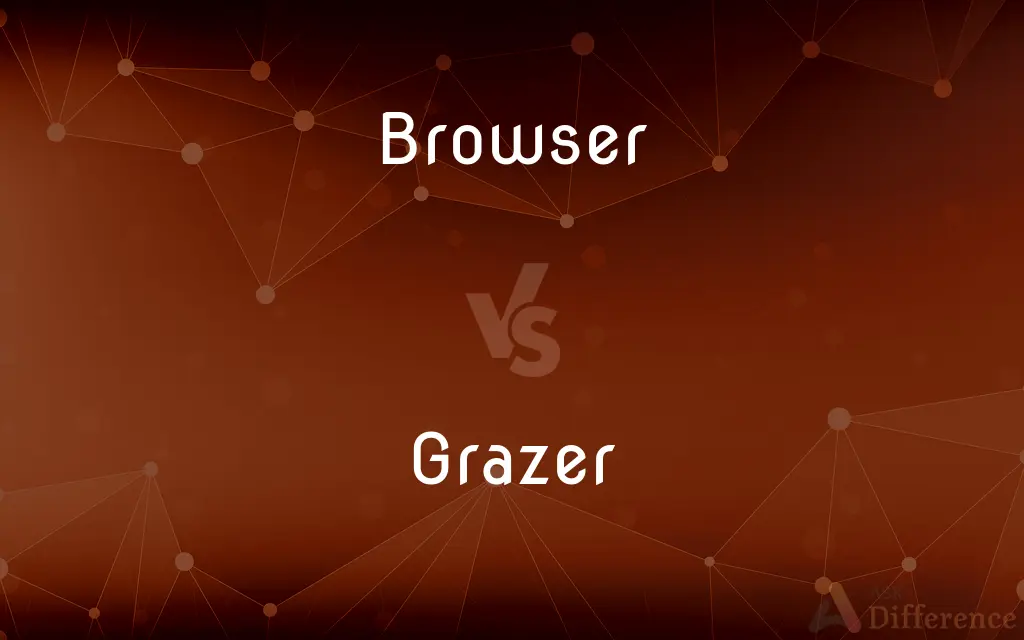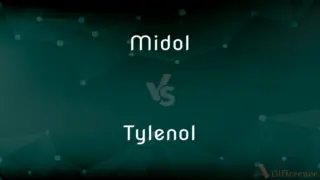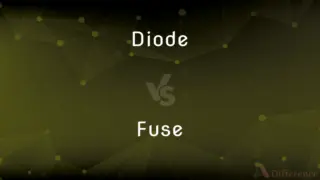Browser vs. Grazer — What's the Difference?
By Tayyaba Rehman & Maham Liaqat — Updated on March 21, 2024
A browser navigates and retrieves information on the internet, while a grazer eats small amounts of food over time, often referring to animals.

Difference Between Browser and Grazer
Table of Contents
ADVERTISEMENT
Key Differences
A browser, in the context of computing, is a software application used for accessing information on the World Wide Web. Users can view web pages, images, and videos through browsers like Chrome or Firefox. On the other hand, a grazer refers to an animal that feeds on plants, especially grass, and spends much of its time eating small quantities of food throughout the day.
Browsers work by sending requests to web servers using HTTP or HTTPS, retrieving web pages which are then displayed to the user. They interpret and render HTML, CSS, and JavaScript to present web content. Grazers, in contrast, engage in a biological process of consuming plant material, often moving slowly over a large area to continuously feed on vegetation.
The functionality of browsers extends beyond merely displaying web pages; they also offer features like bookmarking, extensions, and privacy modes to enhance user experience. Grazers, meanwhile, play a crucial role in their ecosystems by controlling plant growth, cycling nutrients, and serving as prey for predators.
Browsers are constantly updated to improve security, speed, and compatibility with web standards. This ensures users have a smooth and safe browsing experience. Grazers adapt to their environments over time through evolutionary processes, which may include changes in their feeding habits, migratory patterns, and physical traits to improve their efficiency in grazing.
While browsers are an integral part of the digital world, enabling access to a vast amount of information and services, grazers are essential to the balance of natural ecosystems, impacting the distribution and health of plant communities and the overall biodiversity.
ADVERTISEMENT
Comparison Chart
Definition
Software for accessing information on the internet.
Animal that eats small amounts of food frequently.
Function
Retrieves, displays, and navigates web content.
Consumes plant material, often grazing on grass.
Features
Bookmarking, extensions, privacy settings.
Adaptations for efficient grazing, like specialized teeth.
Updates/Adaptations
Regular updates for security and functionality.
Evolutionary adaptations to environment and diet.
Role
Facilitates access to digital information and services.
Contributes to ecosystem balance and nutrient cycling.
Compare with Definitions
Browser
A tool for accessing and navigating information on the internet.
Browsers like Chrome and Firefox make it easy to explore various websites.
Grazer
Eats small amounts of food throughout the day.
Grazers spend much of their time moving and feeding on vegetation.
Browser
Includes security measures to protect user data and privacy.
Modern browsers offer features like incognito mode and phishing protection.
Grazer
Plays a key role in controlling plant growth and nutrient cycling.
Grazers help maintain the health of grasslands by their feeding habits.
Browser
Designed for ease of use, with features like tabs and bookmarks.
The browser's user-friendly interface allows for efficient web navigation.
Grazer
Often exhibit migratory behavior to find fresh grazing areas.
Wildebeests migrate in large numbers to access new grazing lands.
Browser
Interprets and displays HTML, CSS, and JavaScript from web pages.
A browser renders web page elements such as text, images, and links.
Grazer
Primarily consumes plants, especially grass.
Cows and sheep are typical examples of grazers in the animal kingdom.
Browser
Supports add-ons to enhance functionality.
Users can install ad blockers or VPN extensions in their browsers.
Grazer
May have specialized teeth and digestive systems for grazing.
Many grazers have flat, broad teeth ideal for grinding plant material.
Browser
One that browses.
Grazer
To feed on growing grasses and herbage.
Browser
(Computers) A program that accesses and displays files and other data available on the internet and other networks.
Grazer
To eat a variety of appetizers as a full meal.
Browser
A person or animal who browses.
Grazer
To eat snacks throughout the day in place of full meals.
Browser
A person who examines goods for sale but purchases nothing.
Grazer
To feed on (herbage) in a field or on pastureland.
Browser
(computing) A web browser.
Grazer
To feed on the herbage of (a piece of land).
Browser
An animal that browses.
Grazer
To afford herbage for the feeding of
This field will graze 30 head of cattle.
Browser
A computer program that permits the user to view multiple electronic documents in a flexible sequence by the process of activating hypertext "buttons" within one document, which serves as a reference to the location of related document. The term is currently (late 1990's) used mostly for programs which allow traversing hypertext paths in documents on the internet. A typical browser will permit the user to easily reverse direction, and view again documents previously accessed.
Grazer
To put (livestock) out to feed.
Browser
A viewer who looks around casually without seeking anything in particular
Grazer
To tend (feeding livestock) in a pasture.
Browser
A program used to view HTML documents
Grazer
One who or that which grazes, in any sense.
Grazer
An animal that grazes.
Grazer
A television viewer with a short attention span who switches between channels regularly.
Grazer
One that grazes; a creature which feeds on growing grass or herbage.
The cackling goose,Close grazer, finds wherewith to ease her want.
Common Curiosities
How do browsers ensure user security and privacy?
Browsers use features like encryption, privacy modes, and updates to enhance security.
What is the main function of a browser in computing?
A browser is used to access, retrieve, and display web content from the internet.
What ecological role do grazers play?
Grazers help maintain ecosystem balance by controlling plant growth and contributing to nutrient cycling.
Are browsers interchangeable with search engines?
No, browsers access web content, while search engines index and search the web within a browser.
What makes a browser user-friendly?
Features like an intuitive interface, tabbed browsing, and customization options contribute to user-friendliness.
Can browser extensions pose security risks?
Yes, poorly developed or malicious extensions can compromise security and privacy.
How do grazers adapt to their environments?
Grazers adapt through evolutionary changes in diet, behavior, and physical traits for efficient grazing.
Do grazers only eat grass?
While many grazers primarily eat grass, some may also consume other types of plant material.
How do grazers influence biodiversity?
By grazing, these animals can influence plant diversity and the structure of ecosystems, affecting overall biodiversity.
How do migratory patterns benefit grazers?
Migratory behaviors ensure access to food resources, especially in changing seasons or climates.
Can all animals be considered grazers?
No, only animals that primarily feed on plants, especially by grazing, are considered grazers.
What impact do browsers have on the digital age?
Browsers are pivotal in the digital age, enabling easy access to information, communication, and services online.
How have browsers evolved over time?
Browsers have evolved to offer faster speeds, better security, and more interactive and engaging web experiences.
Are there specialized browsers for specific tasks?
Yes, some browsers are optimized for specific tasks, like enhanced privacy or developer tools.
What challenges do grazers face in changing environments?
Grazers may face challenges like habitat loss, climate change, and reduced food availability, impacting their survival.
Share Your Discovery

Previous Comparison
Midol vs. Tylenol
Next Comparison
Diode vs. FuseAuthor Spotlight
Written by
Tayyaba RehmanTayyaba Rehman is a distinguished writer, currently serving as a primary contributor to askdifference.com. As a researcher in semantics and etymology, Tayyaba's passion for the complexity of languages and their distinctions has found a perfect home on the platform. Tayyaba delves into the intricacies of language, distinguishing between commonly confused words and phrases, thereby providing clarity for readers worldwide.
Co-written by
Maham Liaqat












































